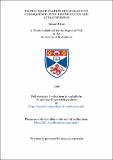Digital manipulation of faces and its consequence upon identification and attractiveness
Abstract
The thesis investigated perception of facial identity and attractiveness with digital manipulation of facial traits. A presentation time paradigm was developed by which stimuli could be presented for a range of brief display periods. Using this paradigm subjects recognised photo-realistic target faces caricatured in shape with greater accuracy than veridical images consistent with previous findings using reaction time as a measure. Subjects were further required to identify colour representations of famous faces which were either veridical, caricatured in colour space or had enhanced colour saturation and intensity contrast (as contrast controls). Recognition accuracy was greater when viewing the colour-caricatured stimuli than either the veridical images or the contrast controls. The removal of colour to produce grey-scale images also decreased accuracy of face recognition indicating that colour information aids facial identification. Caricaturing of faces, therefore, can be extended to the colour domain and, as with shape caricaturing, enhancement of distinctive information can produce a recognition advantage for famous faces. Subjects were also asked to identify the best-likeness for individuals using photo-realistic stimuli and an interactive paradigm with shape-caricature, colour-caricature and contrast-control varied by the user in real-time. The best-likeness with shape manipulation was a slight anti-caricature while with colour-caricature and contrast-control images a mildly exaggerated image was selected as the best-likeness. Thus although images caricatured substantially in colour or shape (+40%) induce superior recognition compared to veridical images such substantial exaggerations are not seen as best-likenesses under prolonged exposure. The gender typicality for white British and Japanese composite faces was manipulated and subjects presented with the images using both a static forced-choice paradigm and an interactive paradigm. Male and female face shapes with enhanced feminine features were consistently found to be more attractive than average. Preference for enhanced femininity for female faces was greater for subjects making within- than cross-cultural judgements.
Type
Thesis, PhD Doctor of Philosophy
Collections
Items in the St Andrews Research Repository are protected by copyright, with all rights reserved, unless otherwise indicated.

